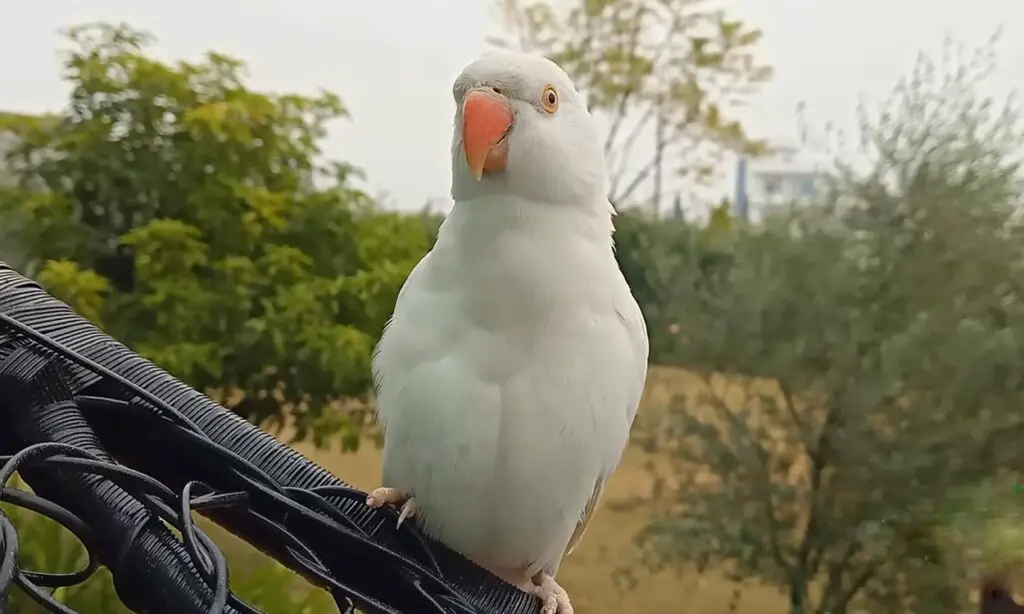African Ringneck vs Indian Ringneck: Which Bird Can Be Your Buddy if You Are Starting Out?
Both Ringnecks may appear the same, but they have their differences. First, African Ringnecks are lime green birds, whereas Indian Ringnecks are vibrant deep green. Indian Ringnecks also come in other colors too!
However, there are other differences between these two birds. They each have subtle contrasts, and each of their traits will determine the option you should choose. From personality to behavior, both of these Ringnecks differ.
Apart from your personal preferences, your environment and living conditions also shape your final decision. So, delve into this article and see for yourself which Ringneck fits your home.
All The Differences You Need to Know About These Avian Friends
Whether you can accommodate the bird or not depends on several factors. Most importantly, it also matters a lot if the bird can also make itself at home in your place. You can be sure of this compatibility by looking at the issues discussed below.
What’s The Nature of These Birds?
African Ringnecks are reserved and highly cautious. Due to this type of behavior, they may take longer to adapt to new people and new environments. However, their shyness can be very charming. The way they cautiously explore their surroundings is lovely.
On the contrary, Indian Ringnecks are social and of an extroverted nature. They will likely approach new people and situations with curiosity and enthusiasm rather than caution. This makes it easier to interact and socialize with them.
So, if you are busy or want the bird to stay on its own, get an African Ringneck. Their mere existence will add an aesthetic to your house. But, if you want a bird to play with, Indian Ringnecks are best, thanks to their social behavior.
Do They Bite?
African Ringnecks are basically wild animals. They can develop biting tendencies if not properly socialized or if they feel threatened.
They may even resort to biting as a defense mechanism because, as you already know, they are reserved. But this also means they won’t do any biting if they are placed in a safe environment.
Indian Ringnecks are angels at this point. They are generally less prone to biting. But you might see occasional nips as a response to discomfort or fear. But, if I’m being honest, this is the case for every bird.
Despite everything, get an African Ringneck if you don’t have an issue with mild biting. But if you have children at home or sensitive skin, contact an Indian Ringneck.

Can They Imitate Human Voice?
Indian Ringnecks are famous for their exceptional talking ability. They have a clear, melodious voice and an impressive ability to mimic words, phrases, and even household sounds. Thanks to their cognitive faculties, they thrive in an interactive environment.
However, although African Ringnecks can learn words and sounds with proper training, they may not show jaw-dropping results like Indian Ringnecks. This is why I recommend Indian Ringnecks if anyone is looking for a talkative bird.
Do They Pluck Feathers?
Unfortunately, almost all birds pluck feathers due to frustration, and Ringnecks are no exception. African and Indian Ringnecks can exhibit feather-plucking behavior due to stress, boredom, or health issues.
Simply put, if they feel unwell, they will pluck their feathers. African Ringnecks are more prone to this behavior as they may internalize stress more than their outgoing counterparts. Their reserved disposition is the culprit here.
How Are They Among Children?
Indian Ringnecks are great around kids. Their social behavior will quickly befriend any children nearby. In addition, their curiosity and willingness to interact can lead to positive interactions. On the contrary, African Ringnecks are not-so-social types.
This is why they may take longer to adjust to kids or new people. At this point, the biting issue becomes a problem. If a child makes the African Ringneck feel threatened, it will bite the child, leading to a bruise or more severe damage.
Although this is not an issue in most cases, it’s always better to opt for an Indian Ringneck if you have children at home. Not only their social attitude but their talkative behavior is also a significant factor here. Kids love to hear a bird talk.
Are They Loud?
Well, yes. They both are loud, especially during certain times of the day. African Ringnecks tend to have quieter vocalizations compared to Indian Ringnecks.
It makes sense because they are not so social and prefer to stay quiet. But this difference is not so significant.
Thus, as both can produce loud calls and screeches, particularly when seeking attention or communicating, it doesn’t make much difference in which bird you choose.
However, as African Ringnecks are less social, they don’t demand much attention. This is why their screaming and noise are mild. Despite everything, neither of these birds is suitable if you live in an apartment or shared space. They can annoy the other dwellers.
What Do They Eat?
Indian Ringnecks are generally good eaters. They readily accept a variety of foods, including fruits, vegetables, nuts, and pellets.
However, African Ringnecks are definitely pickier eaters. They demand more patience and creativity to introduce new foods into their diet.
You may have already picked your choice. However, if you don’t think pickiness will be an issue, you can safely opt for African Ringnecks.

Are They Aggressive?
Both of these Ringnecks can display aggression toward other birds. They mainly do this if they need to be appropriately introduced. Cage aggression can also occur if they feel their territory is threatened.
In this case, their aggression is actually a defensive behavior. This is not alarming, even though it sounds like one. If you can offer them a friendly and safe habitat, neither makes much difference.
Can They Be Trained?
Both are intelligent birds, but Indian Ringnecks are more social than African Ringnecks. Why does it matter? You’ll understand in a second.
As Indian Ringnecks are more social, they interact with humans more. This allows their owner more time to teach different tricks. As a result, Indian Ringnecks learn various tricks within a short duration.
On the other hand, African Ringnecks are less social, and you must have a lot of patience just to teach them a simple trick. But once they learn their trick, they always remember and improve it over time.
What Are the Health Concerns Involved?
All the Ringnecks produce feather dust. However, unless you have a severe respiratory issue, it shouldn’t be a problem. They at least contribute to less dust compared to larger dusty parrot species.
The good thing is, with regular cleaning and proper ventilation, the feather dust shouldn’t bother you much.
How Much Do They Cost?
Neither of these birds comes cheap. Their maintenance cost is not sky-high, but it’s still a lot for birds. Let’s break it down.
An Indian Ringneck can cost $400 per year. This includes food, toys, vet visits, and some extra stuff. If you think this is a lot, then wait for African Ringnecks.
African Ringnecks can cost up to $700 per year. You may need to spend some extra because of their picky dietary habits. However, once you are adapted to taking care of them, you’ll find different tactics to minimize the maintenance cost.
How Energetic Are They?
Indian Ringnecks are noticeably more energetic, while African Ringnecks are not so much. This difference is the result of their personalities. Indian Ringnecks are outgoing and jolly. They enjoy playtime and mental stimulation.
On the other hand, African Ringnecks are less social and don’t like interaction that much. This is why they are slightly less energetic. But if they get the right environment, they can also demonstrate playful activity.
This is why Indian Ringnecks are ideal if you want the bird to be a friend to your kids. However, if you prefer to have a jolly bird hopping around in your house, then an Indian Ringneck is the answer. Otherwise, for a calmer environment, opt for an African Ringneck.

Which Way Are You Flying?
As you can see, these birds have subtle nuances and similarities. If you have particular requirements, then these differences definitely matter a lot. But if you don’t have any mention-worthy demands, both are fine.
Nonetheless, I think the ideal bird for you always depends on ‘you.’ If you want your pet bird to keep your house lit and always keep you uplifted with its little games and tricks, then bring an Indian Ringneck home.
If you are the kind of person who needs their space, then go for an African Ringneck. These birds like to stay on their own, but they will definitely interact with you if you approach them correctly. This is a perfect option if you are a busy person.
Want to know about other bird comparisons? Read more-
Toucan vs Parrot: Which Feathered Friend Would You Choose as a Beginner?
Can I have a Dracula Parrot as a Pet?
Parrotlet vs Quaker parrot: Things to consider before adoption
